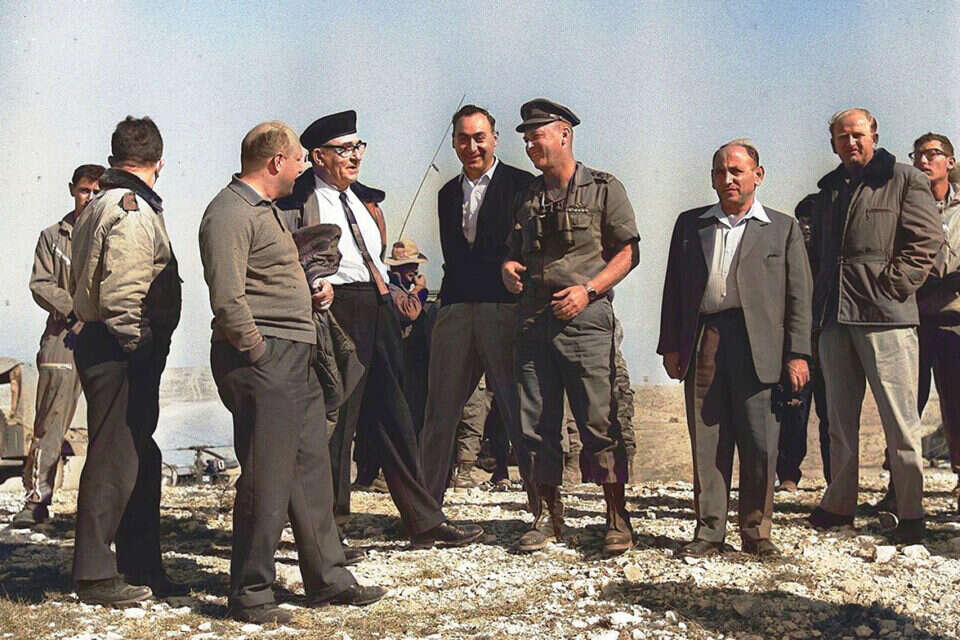Isar Harel, head of the Mossad
Israel Netanovich Halperin was born in present-day Belarus, the son of a wealthy industrialist family.
When he immigrated to the Land of Israel in 1930, at the age of 18, he changed his name to Isser Harel, fulfilled his dream and joined Kibbutz (Shefaim).
He married a kibbutz daughter, and in 1935 the couple moved to Herzliya, lived in a dilapidated shack and worked in an orchard.
In 1942, Harel volunteered for the Haganah organization, and two years later he was assigned to the Shi'i headquarters - the organization's intelligence service - in Tel Aviv. There he began a brilliant 19-year career in the Israeli intelligence services.
Upon the establishment of the state, the Prime Minister, David Ben-Gurion, appointed Isser Harel to head "Shin-Beit" (later the Shin Bet), and after four years of activity he was appointed in 1952 to head the "Institute for Intelligence and Special Tasks" (abbreviated: the Mossad) - an organization whose name was forbidden to be mentioned for decades.
Although the institution was already established in December 1949, it lacked executive powers and dealt with coordination matters.
When Harel took office, he was required to build the organization from the ground up and determine its principles and methods of operation.
In his 11 years of office, Harel was characterized by stubbornness, but also an open mind.
He was extremely diligent, creative and courageous, stuck to the goal with determination and emphasized extremely high ethical norms.
He was jealous of the principles he set and was very careful in any case of deviation from them.
Over the years, Harel amassed great power, and the historian Prof. Michael Bar-Zohar wrote in his book "The Appointed" that he "held in his hand tremendous power, the likes of which was not granted to anyone before him, nor to anyone after him in the history of the State of Israel."
Harel retired from the service in 1963, at the age of 51, served for about a year as a security advisor to Prime Minister Levi Eshkol, served as a Knesset member on behalf of the "State List" in the Seventh Knesset, published ten books - and passed away in 2003, at the age of 91.
Thanks to Yossi Melman, intelligence commentator and author of the book "Imperfect Spies", for the assistance.
Schlager and Ibsen: a new season in the theater
The poster for the play "The Blue Bird" in Bhima, 1952, photo: National Library
During the Tishrei holidays of 1952, the theaters reported on their planned repertoire for the coming year, "against the background of the economic crisis going on in the halls among the empty chairs, the number of which is increasing", according to the actor and director Raphael Kalchkin, at a press conference held at the Bhima Theater. "A new show called 'The Blue Bird', which will premiere and is expected to be a hit" - indeed it was a hit, with 107 performances.
Kalchkin reported another new play called "The Reluctant Doctor", which would be staged by him (it failed, with only 24 performances), and announced that Ibsen's "Per Gent" would continue its success from the previous season (with 85 performances).
Another report about a new play called "Julius Caesar", which should be performed in April 1953 (it was finally performed only in 1961 and was an abject failure, with only 21 performances).
The Chamber Theater focused in those days on contacting Israeli writers, asking them to receive proposals for original plays.
"We received no less than 30 new Hebrew plays," announced the chamber's spokesperson, adding: "In the 2018 season we will focus on separating the chaff from the weeds and adding the better plays to the repertoire.
" 1951, next to "Opera Begrush", which was first presented by the theater in 1933.
The lighter Harbio Theater, "Li-La-Lo", reported its plan to form two separate troupes of actors, one of which will perform at the Rama Cinema in Ramat Gan and the other at the Yasha Hefetz Hall in Tel Aviv, when the repertoire will be joined by a new humorous play called "Yahya Tov" in 2017. .
The price of a hunting license jumped by 2,000%
Hunters in Israel, early 1950s, photo: Studio Sonia Kolodani, "Beitmona" archive
The "Hunters' Organization in Israel" convened a press conference on October 14, 1952 on the subject of "the state's abuse of hunters".
The chairman of the organization, Naftali Greenberg, opened his remarks with a list of complaints on behalf of hunting enthusiasts in Israel against the Ministry of Finance and the Ministry of the Interior. The Ministry of Finance was responsible for taxes and levies on weapons, and the Ministry of the Interior for the allocation of hunting licenses and the supply of rifle bullets to Israeli hunters.
In 1952 there was a change for the worse in the policies of the Ministries of Finance and the Interior, and the sport of hunting entered into distress: the price of a shotgun skyrocketed due to taxes and heavy levies imposed on it, and reached an average of 200 pounds (about two monthly salaries of a middle-class official).
The price for a hunting license jumped 20 times(!), from 1 lira with the establishment of the state to 20 lira, which every hunter had to pay every year when renewing his license.
Bullet prices also rose to 400 pennies per bullet, and the allocation per hunter was sharply reduced to only 25 bullets per year.
This caused a considerable rise in the price of bullets that the hunters had to purchase on the black market.
At a meeting held at the Ministry of the Interior, before Rosh Hashanah, the hunters' representatives were informed about the prices of the license and bullets, and in response they were told: "Not only are the animals you hunt not strictly kosher, but the price of the bullets is sixty percent less compared to devouring the game meat that you and your family eat to your heart's content."
The elder of the hunters in Israel, Ilan Fisher (87) from Kiryat Tivon, told us this week: "Nowadays the troubles with the authorities are a secondary matter, the main problem is that we have almost nothing to hunt anymore."
When will the central bank be established?
When Bank Leumi Israel was established in 1951, to which all the assets and activities of the Anglo-Palestine Bank were transferred, a professional committee was established at the same time that prepared detailed plans regarding the establishment of a central bank in Israel, including guidance regarding its work methods and areas of activity.
The plans had been submitted to the Ministry of Finance for a long time, and when the Minister of Finance, Levy Eshkol, was asked to report at the cabinet meeting held in October 1952 on the progress in their implementation, it became clear that they were set as an immovable stone.
According to him, "the treasury was preoccupied with more urgent matters, and especially with the reorganization of the ministry."
The Prime Minister, David Ben-Gurion, demanded that the Minister of Finance return and report to the government within two weeks whether the Ministry of Finance was able to immediately establish the Central Bank, but the Bank of Israel did not open its doors until more than two years later, on December 1, 1954.
Birthday for the Antiquities Society
During the Tishrei holidays of 1973, the 40th anniversary of the founding of the "Society for the Investigation of the Land of Israel and its Antiquities", which was established in 1913 by a group of spiritual people from the Land of Israel, led by the teacher and public figure David Yelin, who was also one of the founders of Teachers' Organization.
The aim of the society was to deepen the historical, geographical and archaeological research of the Land of Israel.
The first volume of "The Land of Israel - Studies in the Knowledge of the Land and its Antiquities" was presented to the celebrants, who also praised the contribution of Yelin, who passed away 11 years earlier, in 1941, as a miracle.
David Yelin, founder of the Antiquities Society, photo: Wikipedia
Immigrants or "Madhouse"?
In October 1952, immigrants who lived in the ruins of the Arab village of Deir Yassin (now Kfar Shaul near Jerusalem) were required to leave the place in favor of housing for the "mentally ill".
The immigrants refused to leave without being guaranteed an alternative place to live, and on the eve of Sukkot a riot broke out during which dozens of immigrants took control and blocked the entrance gate, while their friends broke into the Ministry of Health in Jerusalem and made names in it.
With the intervention of the police, and after the representatives of the institutions promised to take care of the problem "immediately after the holidays", the spirits calmed down.
The disappearing / businesses that were
Bundle packages
Egged packages, photo: Chaimka Avni
A service that has been available since the early 1960s to Israelis who wanted to safely and in a reasonable amount of time (unlike the Israel Post) deliver a package from one place in the country to another.
At first, the citizen had to come to the central bus station in his locality in order to send or receive a package, but later the Egged company, for an additional payment of a few pounds, allowed door-to-door service.
But then progress came, with other types of service, and Agged Palamat was closed in the late 1990s.
The consumer / Dobri Metika
coated waffle
Coated wafers, photo: "Nostalgia Online" website archive
A waffle coated with a thin layer of chocolate, which began to be sold in the 1950s and has survived there for the most years compared to any other product. Although its packaging has changed slightly over the years - the coated waffle was and remains the ultimate snack, and always went with a bottle of "Tempo" or with juice Oranges. He was even mentioned in the immortal sketch "The Enlisted Car" by the Pale Tracker Trio: "Did the car come with the bapella?
So bring Bafela.
There is no befala?
So bring oranges with bafala."
were we wrong
We will fix it!
If you found an error in the article, we would appreciate it if you shared it with us









